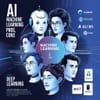Artificial intelligence is transforming the world with its vast potential to improve efficiency, accuracy, and innovation across various sectors. At its core, AI operates on complex algorithms that enable machines to learn from data, make decisions, and perform tasks that typically require human intelligence.
AI offers numerous benefits, including reducing human errors, saving time, and providing unbiased decisions. It enhances decision-making by analyzing vast amounts of data to identify patterns and trends often invisible to humans. AI's ability to process information at high speeds reduces the time required for decision-making. Additionally, AI automates repetitive tasks, freeing humans to focus on more strategic and creative work.
Despite its benefits, AI has several drawbacks. One significant concern is job displacement, as AI systems can perform tasks previously done by humans, potentially leading to job losses in certain sectors. AI also lacks creativity, emotional intelligence, and empathy, which are essential for complex human interactions. Furthermore, AI systems can perpetuate existing biases present in their training data, leading to unfair outcomes in areas such as hiring, law enforcement, and loan approvals.
Healthcare: AI algorithms can analyze medical images to detect early signs of diseases like cancer, improving diagnosis accuracy and treatment outcomes. Finance: AI-powered systems can detect fraudulent transactions, optimize investment strategies, and provide personalized banking experiences.
Manufacturing: AI-driven robots can perform tasks with precision and speed, increasing productivity and worker safety. Transportation: AI-powered self-driving cars can enhance road safety, reduce traffic congestion, and increase accessibility for individuals with disabilities.
Overall, AI has the potential to revolutionize numerous aspects of our lives, from improving business operations to enhancing healthcare outcomes. However, it's crucial to address the challenges associated with AI, such as job displacement, bias, and lack of creativity, to ensure its benefits are equitably distributed.⁴


